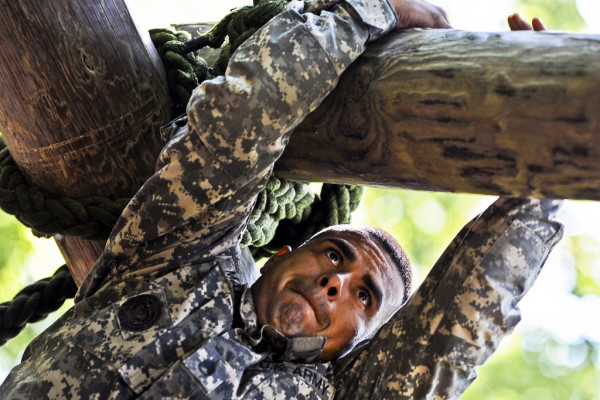

Anyone who’s been a part of or around the military over the last few years knows that resiliency is a high priority. After more than a decade of conflict in Iraq and Afghanistan, the military has had to battle its own demons on the warpath, including spikes in post-traumatic stress, drug and alcohol abuse, and suicides. Recognizing the need to build a stronger, well-rounded force, former Army Chief of Staff General George W. Casey Jr. founded the Comprehensive Soldier Fitness Program, later named Comprehensive Soldier and Family Fitness Program. This program is focused on helping soldiers and their families bounce back from challenges and adversity by building all five dimensions of strength: social, emotional, family, spiritual and physical. In 2013, the Ready and Resilient Campaign was launched, further emphasizing the importance of resiliency to a soldier’s readiness.
As a part of CSF, the military set forth to create a force of master resilience trainers. Soldiers who graduate from the 10-day course learn the resiliency skills of the program, how to use them, and how to teach them to other soldiers in their units.
In 2010, I received an e-mail requesting volunteers to attend the MRT course. The e-mail provided little information about the course or the concept, and there wasn’t much more when I searched online. But what I did find, I became very excited about. It seemed the Army was finally shifting in the right direction and realizing that a soldier’s mental health is just as important to maintain as his or her physical health. I quickly volunteered to attend the course.
The opening day of class kicked off with a very powerful presentation by the former director of the CSF program, Brig. Gen. Rhonda Cornum (now retired). Cornum was the military’s face of resiliency, and rightfully so. Her stories of overcoming experiences as a prisoner of war after being captured during the Persian Gulf War when her Black Hawk helicopter was shot down, made her an ideal soldier to lead the charge in training a more resilient force. I’m sure I wasn’t the only one who felt a surge of energy and excitement to be a part of such a new and positive forward movement in Army training.
Related: 10 military skills that make every servicemember amazing parents.
After attending the course, I realized these weren’t just skills to help in my military career, these were skills to apply to every aspect of my life. Here are the top five that every soldier should consider.
- Focus on self-awareness. Being aware of negative patterns in your thinking or core beliefs that might get in the way of rationale will help you regulate your reaction.While you can’t always control what situation you might be faced with, you can control what you say to yourself in the heat of the moment.
- Never underestimate the power of positive thinking. “Hunt the Good Stuff,” or take a moment to write down a few things you’re happy about or grateful for each morning. There is likely something there that will make you smile and get your day started on the right foot!
- Make it a habit to re-evaluate all of the information when problem solving. It is easy to jump to a conclusion when you can’t see the big picture. Identifying missed information can help with understanding a problem and put you on a better path to finding a solution.
- Focus on learning about your own top strengths as well as the top strengths of others. Knowing these strengths will help with identifying how best to work with each other (at work, home, and socially) and to perform at your best and overcome challenges individually and as a team.
- Be aware of different styles of communication. Just like anything, different communication styles and approaches are important to master to handle different types of people and situations. Be aware of outcomes and keep track of what works. This will help with building relationships.
There are studies done by the CSF2 program that show that resiliency training taught by MRTs has improved soldiers’ lives, particularly younger soldiers just coming out of the military. Now when I do an internet search for CSF or Army resilience, the information and resources are endless, and the program has been extended to directly involve military spouses and families.
I defend this program to the ground. I was blown away by the training, and continue to be impressed by the CSF2 program’s progress. Every soldier needs to be trained in resilience from the start and throughout their military career. It is very promising to see the military taking an active role in the mental health and well-being of its personnel. While some people might remain skeptic, every service member should be on board with ensuring soldiers are the best that they can be.
